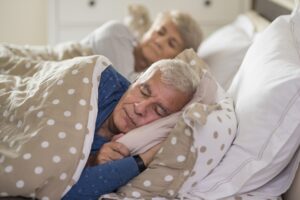
At the recent University of Colorado Department of Medicine’s Research Day, Dr. Christine Swanson talked about her study on whether getting enough sleep could help prevent osteoporosis.
Dr. Swanson explained that osteoporosis can happen for various reasons, like hormonal changes, aging, and lifestyle habits. Some patients she sees have osteoporosis without a clear reason. So, she thinks it’s essential to find new risk factors and consider things that change as we age, like our sleep habits.
Our bones reach their strongest point, called peak bone mineral density, in our early to mid-20s. This peak is higher for men than women and affects how likely we are to break bones later in life. After this peak, bone density stays about the same for a while. However, during menopause, women lose bone faster, and men also lose bone density as they get older.
Sleep patterns change as we age, too. We sleep less overall, and the type of sleep we get also changes. It takes longer to fall asleep as we get older, and we get less of the deep, restorative sleep called slow-wave sleep.
Dr. Swanson also mentioned that our preference for when we sleep and wake up changes as we age, which is called circadian phase preference. Genes that control our body’s internal clock are found in our bone cells.
These genes affect how our bones break down and rebuild. Dr. Swanson explained that bone cells release certain substances into the blood as they work, and these substances can tell us how much bone turnover is happening at any given time.
Our bones have a daily rhythm of breaking down and rebuilding. Dr. Swanson said this rhythm is more pronounced for breaking down bones than building them up.
To learn more about how sleep and our internal clock affect bone health, Dr. Swanson and her team studied how bone turnover changed when people had less sleep, and their daily schedule was disrupted.
Participants in the study lived in a controlled environment where they didn’t know what time it was, and their day was longer than usual. This schedule was meant to mimic the stress of working rotating night shifts or traveling across many time zones.
The researchers found that both men and women had negative changes in bone turnover after the sleep disruption. Younger people, especially women, showed the biggest decreases in bone formation. If the body is making less bone while still breaking it down, it could lead to bone loss and a higher risk of fractures over time, Dr. Swanson explained.
She suggested that younger women might be most affected by poor sleep regarding bone health.